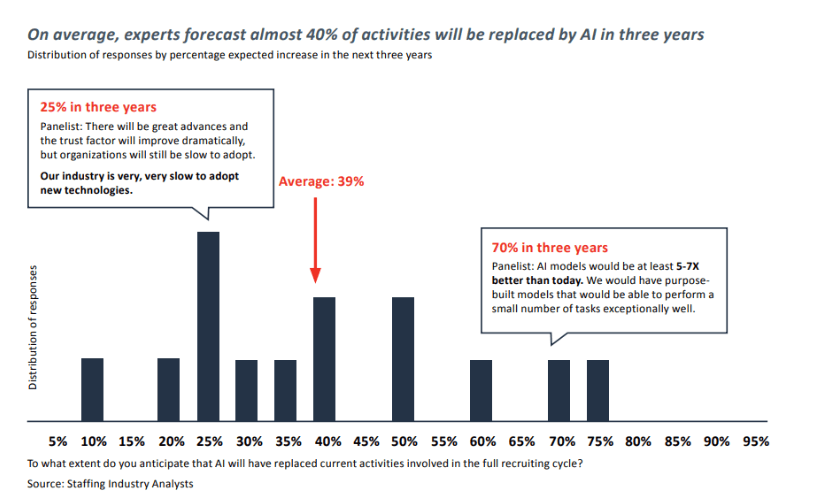Last Updated August 5, 2025
Few topics are more controversial in the current business world than artificial intelligence. Is AI and all of its benefits a net positive, or will AI become a net negative by automating so many labor-related jobs that it causes an economic downturn? This question is highly relevant for one industry in particular: staffing.
One study found that up to 39% of current staffing-related tasks are at risk of being replaced by AI.
However, several staffing tasks are already AI-driven, such as resume screening, and there are certainly many benefits that AI staffing solutions offer.
Let’s put the bigger picture effects to the side for a moment and first focus on how AI currently impacts the staffing industry. Then, we’ll discuss where machine learning recruitment might be headed and how AI will impact the staffing industry in the near future.
The Origin of Artificial Intelligence
While it might be trending now more than ever, AI didn’t just come out of nowhere. In fact, it’s been around for decades.
“AI” was coined by researchers in the 1950s, well before people could even perceive the idea of computers, let alone the internet.
Consider what AI stands for: “Artificial Intelligence”. This is a term that encompasses all human intelligence-based processes that are performed by machines (particularly computers). Computers have been capable of intelligence-based processes for a while, and AI has been a part of society for longer than you may realize.
If you were born in the 1970s or later, you’ve essentially been using AI tools your entire life. Chatbots were communicating with people as early as 1988, and by the 1990s, computers were beating humans in games of chess. Those circular Roomba floor vacuums that are designed to avoid obstacles? They are over 20 years old.
These are all examples of machines performing human intelligence-based processes, otherwise known as AI.
Current Staffing Tools Aided by AI
Consider present-day evidence of digital transformation in staffing and all of the automated tools that are available to us already.
AI-powered systems can analyze huge amounts of data and narrow that data down by deciphering filters, inputted by humans, to pinpoint ideal candidates for available positions. Even remote hiring in general wouldn’t be possible without AI. Chatbots and virtual assistants can schedule candidate interviews, so staffing agency owners and recruiters alike don’t have to dedicate as much time to administrative tasks.
Many of us have experienced a recruiter on LinkedIn reaching out regarding a position we might be a good fit for; often, this interaction is a result of AI-assisted recruiting. This “AI headhunting” can occur when a recruiter provides an AI-driven system with a list of criteria that they would like candidates to meet, resulting in a list of candidates being generated from LinkedIn that fulfills these requirements.
All of this to say, AI’s capabilities won’t come out of nowhere, but the current capabilities still require human assistance and aren’t as inconceivable as they will be down the road. We’ve been gradually building up to the point in the near future when artificial intelligence truly takes off and is able to assist staffing agencies in even more amazing ways.
How AI Will Impact the Staffing Industry in the Near Future
Now that we’ve covered a few examples of the role AI has played in prevalent staffing tools, let’s see where AI staffing is headed.
As a reminder, Staffing Industry Analysts predicts that, on average, 39% of current recruiting activities will be replaced by AI in the next 3 years as adoption of AI increases.

Improved Candidate Matching Through More Advanced AI Deep Learning
It’s no secret that AI has taken a huge leap over the past couple of years, as evidenced by the likes of ChatGPT and BingAI’s image generator. These enhancements will be seen in the staffing realm as well.
As the years pass, AI-powered systems are able to decipher more and more advanced algorithms. For staffing agency owners, this means aspects of candidate outreach and matching can be improved thanks to AI. For instance, systems will have a better grasp of the best times of day to reach out to candidates and understand how to best frame messages.
However, keep in mind that as AI systems are trained to better match candidates, there is an increased risk of ethical issues that could arise. According to Staffing Industry Analysts, “If AI systems learn by watching human behavior, the fear is that they could end up automating human bias.”
Improved Candidate Screening
Closely related to candidate matching, AI staffing advancements are expected to improve the candidate screening process as well. Rather than relying on a candidate to include the exact same keywords in their resume as in a job description, AI will be able to better understand a candidate’s skills by creating a contextual understanding of their resume and drawing useful conclusions about their capabilities.
Jakob Rohn, CEO at WorkN, a mobile staffing platform, says about AI candidate screening, “If they don’t write something in their resume that’s an exact match for what we’re looking for, ChatGPT can infer based on what they’ve done that they might be a good candidate. Inference is really important; that’s a lot of what a recruiter does today.”
Additionally, AI staffing tools will assist in screening candidates for particularly technical jobs. Currently, technical assessments are typically performed by subject matter experts, but AI may be able to aid in the interview process, which could speed up the time spent screening.
Predictive Analytics
Through AI headhunting, recruiters can locate ideal candidates, but perhaps a more wide-scale impact will be the data that AI-driven tools reveal when scouring the web for those candidates.
For example, in one week, a list of 50 candidates for a software engineer position might be provided to a recruiter. This is made possible by artificial intelligence: our computers analyze a list of criteria, assess candidates based on those criteria, and provide the candidates to the recruiter.
Six months later, a list of 25 candidates might be provided for the same position, with the same requirements, at the same company. This tells recruiters that there’s a shift in demand in the market, and strategies can then be adjusted accordingly.
AI tools are already capable of predictive analytics, but as the capacity widens for AI staffing tools to perform more deep learning, predictive analytics will become even more powerful, allowing staffing and recruiting professionals to more quickly identify trends and anomalies in the market.
Virtual Reality Simulations
While not entirely AI-powered, a technological advance that the staffing industry could see in the near-future is the benefit of virtual reality (VR).
Two staffing firms have already begun utilizing VR. They developed a forklift simulator to both assess potential candidates’ skills for forklift operator positions and train candidates. Testers put on the headset and can see what a real-life forklift operator would see. The simulator helps recruiters and hiring managers better understand candidates’ skillsets when operating a forklift, particularly their ability to understand controls, speed of movements, awareness of surroundings, and whether they’re following safety protocols. AI-generated algorithms allow for the creation of predicted hand and body movements when operating, creating unbelievably realistic simulations.
This is a great example of how technology improvements can benefit all parties involved in staffing: the candidate, the staffing agency, and the client. Candidates can get a feel for whether they’re truly prepared for a role, staffing agencies can find the most qualified candidates with less friction during the process, and clients reap the benefits of hiring the most qualified of the candidates.
Improved RPA
Unlike AI, RPA (Robotic Programming Automation) bots are not capable of continuous learning or making decisions on their own. They can mimic human actions but don’t problem-solve or make data-based decisions.
However, RPA bots are extremely useful when it comes to automating tedious tasks, including data entry, form filling, and list-building. If you own a small staffing agency, these mundane tasks can be highly time-consuming, so these bots are particularly useful.
Programmers are building out RPA bots’ process discovery and big data-handling skills as you read this. This means even more mundane staffing-related tasks will be automated, such as inputting candidate and new hire information into spreadsheets, assisting with the onboarding process, and perhaps even reference checking.
Semantic Search and Large Language Models
AI’s ability to match candidates with job openings by comparing keywords on resumes with keywords in job descriptions is one thing. The ability for AI to identify keywords and their synonyms, understand these terms within a larger context, and then match candidates with job openings based on that contextual understanding is another. This is called “semantic search”.
A relatively new phenomenon, semantic search also involves AI having the ability to leverage keyword intent to improve the relevance of results. This prevents applicants from feeling forced to overload their resume with as many relevant keywords as possible just because it will ensure their resume is identified by the screening technology. Semantic search will be a relief for staffing agency employees who are wary of trusting automated screening methods presently in place, ultimately ensuring the most ideal candidates are being identified for a staffing agency’s clients.
Semantic search is also closely related to large language models (LLMs), which take a step further than linking keywords and keyword synonyms between resumes and job descriptions. An LLM is a more advanced level of AI that, to understand properly, requires a deep dive into programming. But, to highlight the point without getting too technical, an LLM is essentially an extremely high-level, deep learning model that sifts through enormous amounts of data to better understand how each data point relates to one another. Once LLMs become more advanced and commonplace, who knows what the future holds?
AI Staffing Software
AI staffing software essentially combines AI tools with CRM software to improve machine-learning-based recruitment.
There are a few AI staffing software options you can explore, such as Manatal, Betterleap, and Paradox.
AI staffing software is tailored for one thing: streamlining everything about the recruiting process.
Let’s take a look at Manatal’s “AI Recommendations” feature, for example. When a recruiter utilizing this feature inputs a new position for the AI-powered system to recruit for, they are provided with a 1-10 slider for each skill (based on importance) that’s necessary for the position.
For instance, a candidate with design skills might be a 5, while budgeting skills might be a 10, as it’s absolutely necessary in order to excel in the role. Once all of the skills are rated, the system analyzes those ratings, scans for applicants, and churns out the most ideal candidates.
Furthermore, it greatly streamlines the often mundane exercise of writing a job description. Instead of writing paragraph after paragraph of text, you can simply bullet out a list of requirements before the program instantly generates a well-written job description.
These examples of customization made possible by AI-created algorithms are just a snapshot of why so many staffing agency and recruiting agency owners choose AI staffing software.
The Benefits of AI Staffing
We’ve covered multiple ways how AI will impact staffing, but how exactly will this all benefit staffing professionals?
1. Reduced Manual Labor: RPA bots completing tasks such as data entry significantly reduce the amount of manual labor required by staffing agency owners and employees.
According to Jon Hill, CEO of The Energists, “the main benefits of AI are speed and efficiency. Using AI to review, screen, and select the right candidates or temporary workers for a role is much faster and requires less hands-on work than having a human team member review them manually.”
2. More Room for Customization: AI staffing software allows staffing agencies to expand their search network to literally countless potential candidates. There is no way humans could quickly screen hundreds of thousands of LinkedIn users, but AI-powered tools can!
3. Cost-Cutting: Since AI can do things that humans can’t, and in a far more efficient and timely manner, that means you don’t have to hire as many employees, leading to increased profit margins.
4. Absence of Bias: Studies have shown that we are all inherently biased. The introduction and utilization of AI eliminates natural human biases and ensures that candidates are hired strictly based on their qualifications, experience, and ability.
5. Improved Candidate Matching: All of the above leads to one thing: improved candidate matching. While this can enhance your staffing agency processes, other staffing companies will have the same opportunity for improvement. That’s why it’s critical to be an early adopter of AI staffing solutions to get a leg up on the competition.
6. Predictive Analytics: Artificial intelligence in staffing will become even more advanced and beneficial as time passes. AI’s ability to decipher data, identify future hiring needs, and analyze trends will become absolutely pivotal for staffing agency owners.
At the end of the day, all of these benefits will help staffing agencies find new clients and candidates and will help maximize deliverables for those clients.
AI-Related Challenges Staffing Agencies Face
AI poses a few potential problems for staffing agencies, although many of these problems are macro-level and could be felt across all industries.
It’s no secret that the introduction of AI presents a threat to the workforce. While cost-cutting through hiring fewer employees is a benefit for business owners, that harms job seekers. Fewer employees required means fewer available positions, which leads to the potential for increased unemployment numbers. This won’t be unique to staffing; it will touch every industry (some more than others).
Hill noted that, while AI will improve speed and efficiency, this can pose a concern for recruiters who believe their jobs may be at risk of being fully automated.
“The biggest challenge is maintaining the human touch in the staffing process,” Hill said. “The more automated a process is, the more impersonal it feels. This can lead to a feeling of disconnection between the staffers and the agency that can carry over into the businesses that hire them.”
Additionally, there are potential ethical issues with AI. Peter Wood, Chief Technical Officer at Spectrum, pointed to bias, privacy, and transparency as specific ethical concerns.
“Ensuring that AI systems are unbiased and fair requires continuous effort and vigilance,” Wood said. “The key to overcoming these challenges lies in a balanced approach that leverages AI’s strengths while remaining mindful of its limitations and ethical implications.”
For example, while there is a great opportunity for AI-based recruiting to lead to a less biased hiring process, there is the possibility that AI models will learn and develop similar tendencies as humans based on the preferences of the person operating the AI-powered system, essentially automating the bias in the recruiting process.
But these sorts of challenges aren’t anything new. Even in a world without AI, there exists bias in recruitment, research shows. “Unconscious bias” in the staffing and recruiting world occurs when opinions are formed about candidates based on irrelevant criteria, such as past non-work experiences or hobbies. While all of this can be cause for concern, it can become less problematic as long as humans behind recruiting and controlling these AI-powered systems have a good understanding of its imperfections, as Wood noted.
Similarly, because AI is so new in the staffing industry, there are limited compliance and legal requirements tied to AI. In a report from Staffing Industry Analysts on the use of AI in staffing, one person said, “There are no rules and regulations, and nobody wants to be the one that gets the landmark case named after them.”
AI in Staffing FAQs
Will AI impact the staffing industry?
Yes, AI will impact the staffing industry. In fact, it already has. Tools such as chatbots on staffing agency websites, along with predictive analytics, are in place thanks to artificial intelligence. AI will continue impacting the staffing industry moving forward through new AI-powered tools that will improve the candidate sourcing, matching, and screening processes.
What is an AI headhunter?
An AI headhunter is a system powered by AI that has the ability to understand filters for positions, narrow down candidates based on those filters, identify top candidates, and even screen candidates. It can also be used to match candidates with job openings. For example, it will identify skills from the candidate’s resume and match those skills with open job descriptions, and vice versa.
While an AI headhunter can’t function without human assistance (for example, setting up the filters), it greatly optimizes the recruitment process, particularly the steps in between the beginning and the end of the process.
What effects will AI have on employees in the staffing industry?
The further development of AI will have many benefits for staffing workers, such as reducing manual labor. However, there are mixed opinions on whether the overall outcome will be net positive or net negative. One study found that workers on assignment could increase by 9% over the next three years due to implications from AI, but it also found that 39% of current staffing industry tasks are at risk of being replaced by AI.
Michael McCareins is the Content Marketing Associate at altLINE, where he is dedicated to creating and managing optimal content for readers. Following a brief career in media relations, Michael has discovered a passion for content marketing through developing unique, informative content to help audiences better understand ideas and topics such as invoice factoring and A/R financing.









